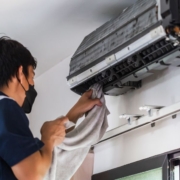How to Fix AC Not Blowing Cold Air
An air conditioning (AC) system that fails to blow cold air can make indoor spaces or vehicle cabins uncomfortable, especially during hot weather. Several factors can cause an AC system to underperform, including mechanical issues, refrigerant problems, and airflow restrictions. Understanding the reasons behind the malfunction and how to address them ensures the system works efficiently and maintains comfort.
Common Causes of AC Not Blowing Cold Air
One of the main causes of an AC not producing cold air is low refrigerant levels. Refrigerant, often R-134a or R-1234yf in vehicles and R-410A in residential systems, absorbs heat from the air and releases it outside. Leaks in coils, hoses, or fittings reduce refrigerant, preventing proper cooling.
Another common issue is a dirty or clogged air filter. Filters capture dust and debris, but when blocked, airflow decreases, reducing the system’s ability to cool effectively. Inadequate airflow can also cause the evaporator coil to freeze, further limiting cold air output.
Faulty compressors are a frequent mechanical cause. The compressor pressurizes the refrigerant, enabling heat exchange. If the compressor fails, the refrigerant does not circulate correctly, and the system cannot cool. Electrical issues, such as blown fuses, tripped breakers, or malfunctioning thermostats, can also prevent the AC from producing cold air.
In vehicle AC systems, problems may include blocked condenser coils, damaged fans, or issues with blend doors that control airflow through the cabin. Environmental factors like high ambient temperatures can reduce cooling efficiency, especially if the AC is not sized appropriately for the space.
Steps to Fix AC Not Blowing Cold Air
Check refrigerant levels using gauges and inspect for visible leaks in pipes, coils, and connections. Leaks require professional repair and safe refrigerant recharge. Maintaining proper refrigerant levels ensures heat transfer functions correctly.
Inspect and replace air filters if dirty. Standard residential filters should be replaced every 1 to 3 months, while vehicle cabin filters may need replacement every 12,000 to 15,000 miles. Clean coils, fans, and vents to remove dust and debris that obstruct airflow. Proper airflow maintains system efficiency and prevents coil freezing.
Test the compressor and electrical components. Ensure the compressor engages when the AC is turned on, and check fuses, relays, and circuit breakers. In vehicles, verify that the AC clutch engages, and all electrical connections are secure. Malfunctioning components often require professional replacement.
In vehicle AC systems, check the condenser for obstructions like leaves or dirt, and ensure the condenser fan operates correctly. Inspect blend doors or actuator motors to ensure cold air reaches the cabin. In extreme heat, consider using sunshades or parking in shaded areas to reduce system load.
Preventive Maintenance
Regular maintenance improves AC performance and prevents cold air issues. Clean filters and coils, check refrigerant levels, and inspect mechanical and electrical components periodically. Scheduled professional inspections for residential and vehicle AC systems can detect leaks or component wear before a failure occurs. Proper maintenance extends system life and ensures consistent cooling.
FAQ
Why is my AC blowing warm air even when on full power?
Warm air may result from low refrigerant, a frozen evaporator coil, or a malfunctioning compressor. Check refrigerant levels and airflow to identify the cause.
Can a clogged air filter cause AC to stop cooling?
Yes. A dirty air filter restricts airflow, reducing cooling efficiency and potentially freezing the evaporator coil.
How often should AC filters be replaced?
Residential filters should be replaced every 1 to 3 months, while vehicle cabin filters are recommended every 12,000 to 15,000 miles.
Is it safe to recharge AC refrigerant myself?
Recharging refrigerant requires proper equipment and handling to avoid injury or environmental harm. Professional service is recommended for accurate and safe results.
Can electrical issues cause AC to blow warm air?
Yes. Blown fuses, tripped breakers, or faulty thermostats can prevent the compressor from functioning, leading to warm air output.
Conclusion
An AC not blowing cold air is usually caused by low refrigerant, airflow restrictions, mechanical failures, or electrical problems. Checking refrigerant levels, cleaning filters and coils, inspecting compressors, and addressing electrical issues are key steps in restoring cold air output. Regular maintenance, including filter replacement, coil cleaning, and professional inspections, helps prevent future problems and ensures efficient cooling. Understanding these factors allows homeowners and vehicle owners to maintain optimal comfort and avoid costly repairs.

